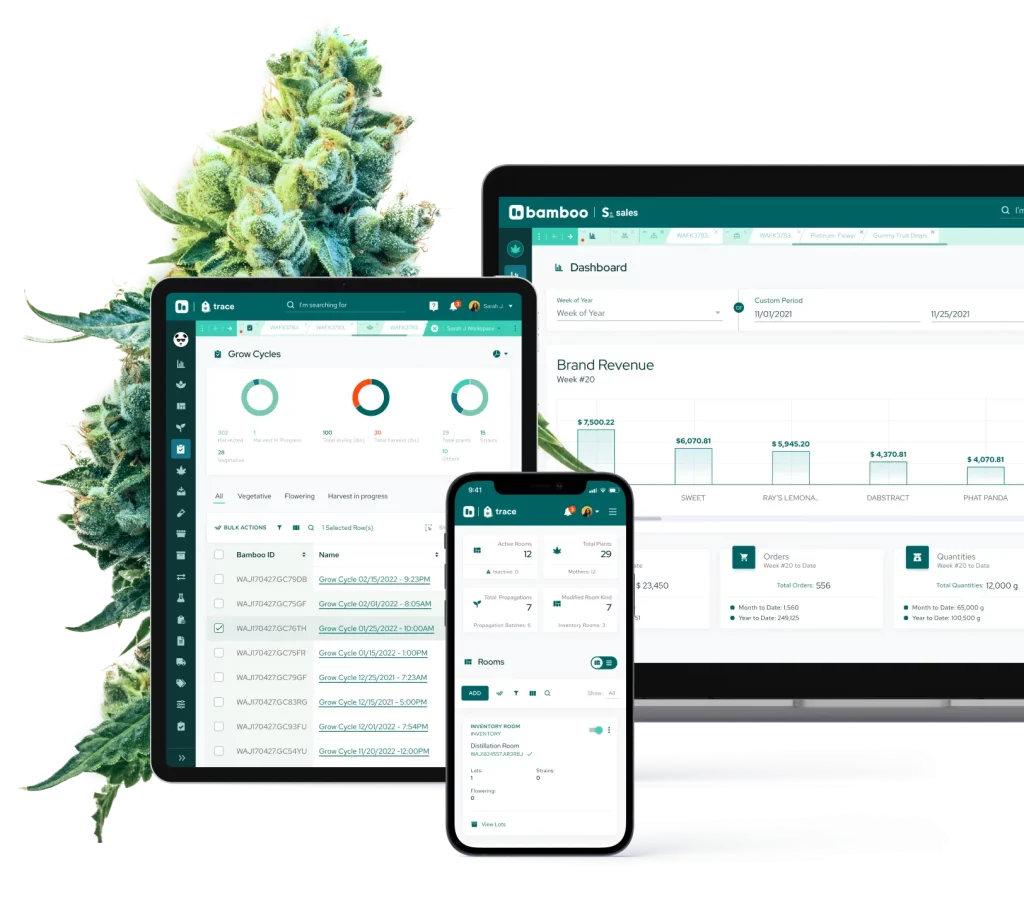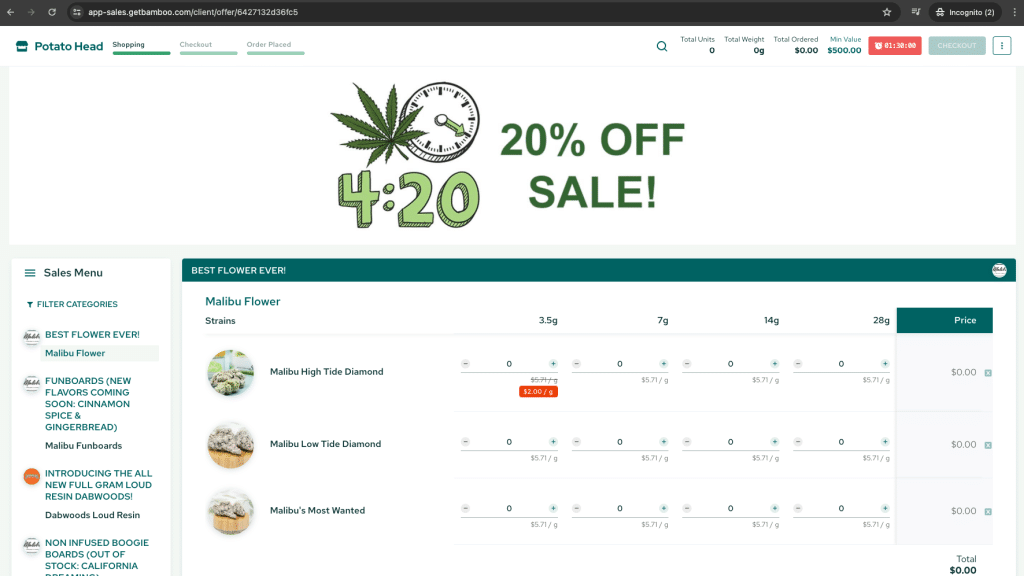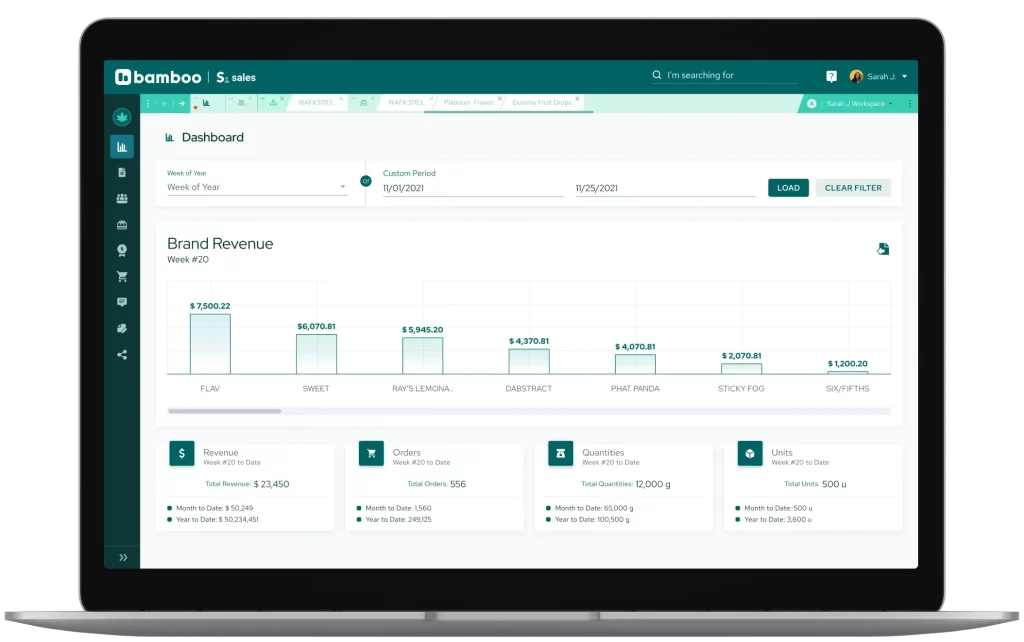California Track and Trace and Seed to Sale Cannabis Software
Bamboo Trace streamlines all of your seed-to-sale cultivation and processing operations, simplifying every process in the supply chain. Fully integrated with Metrc, Trace was built from the soil up, enabling full customization to accommodate everyone, from startup grows to larger, multi-state operators. By taking advantage of our state-of-the-art software, cannabis businesses have realized significant improvements in their cultivation and processing workflows.

California's Recreational Market
California’s recreational cannabis market, the largest in the United States, has continued to evolve and mature. Here’s an overview of some key developments:
- Sales and revenue:
- According to the California Department of Tax and Fee Administration, total adult-use cannabis sales for the 2023 calendar year reached approximately $5.2 billion, a 15% increase from the previous year.
- The state collected around $1.1 billion in cannabis tax revenue, which is allocated to various programs, including youth substance abuse prevention, environmental restoration, and public safety.
- Market trends:
- The demand for cannabis delivery services continued to grow, with more retailers offering online ordering and home delivery options.
- Craft and premium cannabis products gained market share, with consumers increasingly seeking out high-quality, artisanal offerings.
- The market saw a surge in cannabis-infused beverages, particularly those with low doses of THC and CBD for casual consumption.
- Regulatory changes:
- In early 2024, the California Bureau of Cannabis Control implemented new regulations aimed at streamlining the licensing process and reducing barriers to entry for small businesses.
- The state also launched a new track-and-trace system to enhance supply chain transparency and prevent diversion to the illicit market.
- Industry developments:
- Consolidation continued in the California market, with several large mergers and acquisitions among cannabis companies seeking to expand their footprint and achieve economies of scale.
- The state issued additional licenses for consumption lounges and events, creating new opportunities for cannabis tourism and experiential marketing.
- Several major California-based cannabis brands expanded into other states, leveraging their brand recognition and product quality.
- Social equity:
- California continued to implement its social equity program, which provides licenses, technical assistance, and funding for individuals and communities disproportionately impacted by cannabis prohibition.
- The state also expanded its expungement efforts, automatically clearing the records of individuals with past cannabis convictions.
- Challenges:
- Despite legalization, the illicit market remained a significant challenge, with unlicensed businesses undercutting legal operators and evading taxes and regulations.
- The state faced ongoing issues with local control, as many cities and counties continued to ban or restrict cannabis businesses, limiting access for consumers.
Overall, California’s recreational cannabis market continued to grow and evolve, with increasing sales, product innovation, and regulatory developments. The state remains committed to promoting a well-regulated and equitable industry that generates revenue and creates opportunities for diverse communities. However, challenges such as the illicit market, high taxes, and local access issues will require ongoing attention and collaboration between policymakers, regulators, and industry stakeholders.
Why Do California Cannabis Businesses Love Bamboo?
In addition to traceability, Bamboo also provides powerful sales solutions to bring your organization’s sales to the next level. Combine the Bamboo Sales platform with Bamboo Trace and ensure optimal efficiency across your cultivation, processing, and sales teams. This powerful integration maximizes productivity and streamlines operations, allowing your business to operate at its full potential.
Take advantage of Bamboo’s live inventory management, fully customizable online sales menus, order tracking, robust dashboards and reporting, and more to modernize and enable growth within your organization.
California's Road to Recreational Cannabis
California has had a long and complex history with cannabis, being the first state to legalize medical marijuana and eventually becoming one of the largest legal recreational markets in the world. Here’s a brief timeline of California’s road to recreational cannabis:
- 1996 – California became the first state to legalize medical marijuana with the passage of Proposition 215, also known as the Compassionate Use Act.
- 2003 – Senate Bill 420 was passed, establishing a voluntary state ID card program for medical marijuana patients and caregivers.
- 2010 – Proposition 19, which would have legalized recreational cannabis, was rejected by California voters.
- 2015 – The Medical Marijuana Regulation and Safety Act (MMRSA) was passed, establishing a comprehensive regulatory framework for the state’s medical cannabis industry.
- 2016 – Proposition 64, also known as the Adult Use of Marijuana Act (AUMA), was passed by California voters, legalizing recreational cannabis for adults 21 and older.
- 2017 – The Medicinal and Adult-Use Cannabis Regulation and Safety Act (MAUCRSA) was signed into law, creating a unified regulatory system for both medical and recreational cannabis.
- January 1, 2018 – Legal sales of recreational cannabis began in California.
- 2018-2021 – California’s cannabis market has continued to grow, with the state generating over $1 billion in tax revenue from cannabis sales since legalization.
- 2021 – The state has been working to consolidate the three licensing authorities (Bureau of Cannabis Control, Department of Food and Agriculture, and Department of Public Health) into a single Department of Cannabis Control to streamline regulations and oversight.
Despite legalization, California has faced challenges such as the persistence of the illicit market, high taxation, and complex regulations. The state continues to refine its policies to address these issues and create a more sustainable and equitable cannabis industry.
Traceability, Compliance & Regulation in California
On November 8, 2016, Prop 64% was passed by a 57% to 43% vote, legalizing recreational cannabis in California. The Marijuana Act allows for local regulation and taxation. To track the massive amount of taxation that the state was going to bring in, California partnered with Metrc in 2017 to adopt a series of regulations and guidelines for the cannabis industry. The California Cannabis Track-and-Trace (CCTT) system was enacted for the state to record all movements and inventory of products through the cannabis supply chain – full transparency from seed to sale.
Metrc (Marijuana Enforcement, Tracking, Reporting, and Compliance) is a software company based out of Florida. They provide cloud-based tracking software to state governments to help govern and safeguard the legal cannabis markets.
Bamboo Trace is a software solution seamlessly integrated with Metrc to facilitate compliance with the California Cannabis Track and Trace (CCTT) program. By leveraging Bamboo Trace, businesses can simplify numerous daily operations, enhancing efficiency and compliance. Moreover, Trace can be integrated with Bamboo Sales, providing comprehensive support for sales operations within companies. Bamboo Sales optimizes inventory management, simplifies buying and selling processes, and allows stakeholders to dedicate more time to cultivating enduring relationships with their clients. This integration not only ensures regulatory adherence but also enhances overall operational productivity and customer satisfaction.
In California, the cannabis industry is regulated by the Department of Cannabis Control (DCC), which oversees the licensing, enforcement, and regulatory oversight of commercial cannabis activities. Traceability, compliance, and regulation are essential components of California’s cannabis market. Here’s an overview of these aspects:
- Traceability:
- California uses the California Cannabis Track-and-Trace (CCTT) system, powered by Metrc, for seed-to-sale tracking of cannabis products.
- All licensed cannabis businesses are required to use the CCTT system to record inventory, transfers, and sales data.
- Unique identifier tags are assigned to each plant and product package, enabling detailed tracking throughout the supply chain.
- Compliance:
- Cannabis businesses must comply with a wide range of regulations set by the DCC, including security requirements, inventory tracking, product testing, packaging, and labeling standards.
- Retailers must verify customer age and adhere to purchase limits to ensure compliance with state laws.
- Licensees must maintain accurate records and report their activities through the CCTT system.
- Regulation:
- The DCC is responsible for licensing and regulating cannabis businesses across the supply chain, including cultivators, manufacturers, distributors, retailers, and testing laboratories.
- The agency sets rules for product safety, environmental protection, advertising, and marketing to protect public health and prevent access by minors.
- The DCC conducts inspections and investigations to ensure licensees comply with state regulations.
- Testing:
- All cannabis products must undergo rigorous testing by DCC-licensed laboratories before being sold to consumers.
- Testing includes analyzing potency, pesticides, microbial impurities, and other contaminants to ensure product safety and quality.
- Test results are recorded in the CCTT system, and only compliant products are allowed to enter the market.
- Social Equity:
- California has implemented social equity programs to address the disproportionate impacts of previous cannabis prohibition on certain communities.
- These programs provide support, resources, and priority licensing for individuals from disadvantaged backgrounds seeking to enter the legal cannabis industry.
- Enforcement:
- The DCC has the authority to conduct investigations, issue fines, and suspend or revoke licenses for non-compliance with state regulations.
- The agency works with local law enforcement to combat the illicit cannabis market and prevent diversion of legal products.
What are the drawbacks of cannabis marketplaces?
Cannabis marketplaces offer a wide array of brands and products for buyers to browse through, much like flipping through a magazine or catalog. While this is convenient for buyers, it often leads to a race-to-the-bottom mentality among sellers, as they compete to undercut each other on price.
Marketplaces such as Leaflink, Nabis, Cultivera, GrowFlow, etc, while beneficial in theory, provide little added value beyond serving as a platform for brands to showcase their products. As a result, sellers have limited control over how their products are presented and struggle to differentiate themselves.
Bamboo was created to address this issue by empowering cannabis brands to customize their own sales menus and take control of how their products are showcased to clients and buyers. By providing tools to build personalized menus and recommended orders, Bamboo enables brands to stand out and drive higher sales. Why? When buyers are focused on your cannabis brands and products, they tend to pay more attention and often make larger purchases.
Ultimately, the success of a cannabis brand depends on the effort put into crafting and optimizing its sales menus. While it may be tempting to rely on marketplaces for exposure, brands that take control of their sales menus and strategies often see greater success in the long run.
Bamboo Trace
✔ Quick-action buttons available in every module for swift navigation and action execution.
✔ Simplified traceability through real-time two-way synchronization with California’s seed-to-sale system (Metrc).
✔ Receive instant notifications for important updates and events.
✔ Work in offline mode, accessible on both mobile and desktop devices, especially useful during periods of downtime in Metrc API systems.
✔ Ability to support multiple licenses for comprehensive management of operations.
✔ Customize label templates to meet California’s Metrc regulations and efficiently generate multiple labels for various plant and product requirements.
✔ Comprehensive management of Strains, Rooms, Propagations, Grow Cycles, Plants, Harvests, Disposals, Inventories, Conversions, QA Samples, and more, all integrated within Bamboo Trace.
✔ Effortlessly process orders and generate manifests in just minutes for enhanced efficiency.

Bamboo Sales
✔ Utilize the finest Sales Menus available in Cannatech for enhanced sales strategies.
✔ Seamlessly integrate Sales Menus with your website for expanded reach and accessibility.
✔ Simplify email marketing efforts with the built-in feature tailored for sending sales menus effortlessly.
✔ Gain insights through comprehensive sales analytics and reporting on clients, sales reps, and customizable metrics.
✔ Generate numerous recommended orders (proposals) to cater to diverse client needs.
✔ Customize Real-time Sales Menus according to preferences and branding.
✔ Easily manage discounts, credits, pricing tiers, and distribution lists for streamlined operations.
✔ Efficiently handle all your sales enablement strategies within the Bamboo Sales platform.

